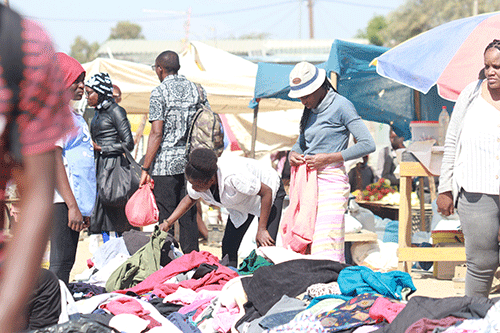WALVIS BAY – The second-hand clothing industry will soon be paying duties on imported goods.
The sector has been supporting thousands of households throughout the country who import and sell second-hand clothes without the government benefitting anything through such imports.
Namibia Revenue Agency (NamRA) commissioner Sam Shivute recently told the media the government is losing out on millions in revenue as these clothes are mainly smuggled into the country, despite the fact that duties are applicable to second-hand goods.
Shivute, who was at the coast in late August, explained they have been looking into the issue and will come up with a solution within the next two months that will see such entrepreneurs either being charged at least 20% on their total imports or a flat rate.
“The duties applicable to second-hand goods is a Southern African Customs Union (SACU) requirement and is not a Namibian law at all. So what we have noticed is that people have resorted to making money from smuggling these bales into the country. As a result, the smugglers are getting the share that was supposed to go to the government,” Shivute explained.
According to him, one is required to pay at least N$25 for every kilogramme of second-hand clothes that are imported to Namibia.
However, Shivute said these import cost in terms of customs duty can sometimes go up to N$2 500 and leave the seller without any income while the smuggler makes money from every bale he imports illegally.
He added that these bales are easily smuggled in, especially from Angola, as the borders are porous and pose a challenge for border patrol.
“We have been pondering on a solution to solve this problem of the smugglers. The sellers sometimes do not make money, as they do not know what the bags contain at all. However, at NamRA we always want to be solution-focused, so we have engaged a number of experts and customs officials and we did find a solution,” Shivute explained.
According to him, one of the provisions within the law says that one can be charged per kilogramme, but added that this can be expensive.
“One of the experts also said it is possible that the method of payment can be changed so that you pay a certain percentage on the imported bags by means of a flat rate. However, it would require an internal submission and a management decision so that revenue for government is not lost. This will be within the next two months,” Shivute said.
According to him, 63% of imported goods from other countries for trading purposes are undervalued, misclassified and not declared, which is causing the State to also lose considerable amounts of money.
Walvis Bay entrepreneur, Lineekela Hasheela, who has been buying and selling bales after she lost her job through Covid-19 last year, expressed her concern over the development saying that paying duties will kill her business.
“The price of bales has increased over the last two years from N$800 to at least N$2 000. We hardly make a profit these days as buying bales is also a gamble. We will have to increase the prices again and lose clients and find ourselves soon on the streets. Paying duties will kill our industry,” she said.
Meanwhile, some African countries back in 2016 banned the importation of second-hand clothes, saying that Africa has become the dumping site for the world’s second-hand vehicles and clothes.
Back in March 2016, the East African Community (EAC), which includes Kenya, Rwanda, Tanzania, Uganda and Burundi first announced plans to phase out imports of used clothing so that its nascent local textile and apparel industry would have the chance to develop and grow.



